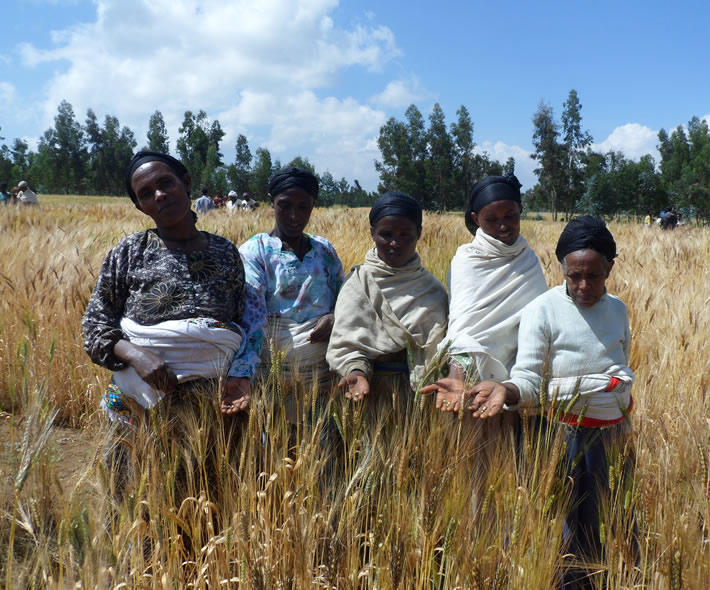Harnessing traditional knowledge to wheat breeding in Ethiopia

A new study of durum wheat varieties in Ethiopia, shows the value of including farmer evaluations based on traditional knowledge into crop breeding practices.
A new study of durum wheat varieties in Ethiopia, shows the value of including farmer evaluations based on traditional knowledge into crop breeding practices.
A new paper, co-authored by scientists from Bioversity International, the Scuola Superiore Sant'Anna, and the University of Bologna, Italy, and the Mekelle University and Amhara Regional Agricultural Research Institute, Ethiopia, outlines a study in which two smallholder communities in the Ethiopian Highlands evaluated 400 Ethiopian wheat varieties.
With climate change, increasing land degradation and global population, business as usual is no longer an option when it comes to farming. The Intergovernmental Panel on Climate Change (IPCC) predicts that climate change will reduce agricultural production by 2% while demand increases by 14% every decade until 2050. For a country like Ethiopia, the biggest producer of wheat in sub-Saharan Africa, and where 80% of the population is involved in farming, finding varieties of wheat able to grow in the changing conditions is vital for food security.
While modern breeding methods have shaped the crops we grow, including today’s increasingly sophisticated methods such as genome sequencing and gene mapping, these methods are now being mixed with traditional farmers’ knowledge to come up with a diverse recipe for climate change adaption.
Smallholder farmers have been selecting new crop varieties since the invention of agriculture 10,000 years ago. The sum of their choices constitutes the agricultural biodiversity we know today.
Participatory plant breeding that uses farmers' knowledge and experience throughout the breeding process has been implemented for many years and in a number of countries, and can be an effective approach to develop more productive and better adapted varieties. Yet the advent of modern breeding made it very difficult for farmers to be involved in producing better varieties. The urgency of speeding up the process of developing more productive, widely-adapted varieties, also meant that participatory plant breeding became increasingly marginalized, considered only valuable to produce results that have only local relevance. What is often overlooked is that the varieties need to address the needs of the farmers as they ultimately are the ones who will plant and tend them.
A new paper from a study carried out by scientists from Italy and Ethiopia* shows that it is possible to bring participatory approaches, genomics, and quantitative genetics together to trace the genetic basis of smallholder farmer preferences of durum wheat traits.
 Scientists asked farmers from two communities in the Ethiopian Highlands to evaluate 400 Ethiopian wheat varieties. They then used that information to map farmers’ preferences to the genome. The results are the first evidence that farmers’ knowledge can be used to detect areas in the genome for the traits under investigation, and therefore it can be used even in modern molecular-based breeding. Farmers’ evaluations potentially provide the same genomic targets as metric measurements of phenotypes, and could also detect additional ones.
Scientists asked farmers from two communities in the Ethiopian Highlands to evaluate 400 Ethiopian wheat varieties. They then used that information to map farmers’ preferences to the genome. The results are the first evidence that farmers’ knowledge can be used to detect areas in the genome for the traits under investigation, and therefore it can be used even in modern molecular-based breeding. Farmers’ evaluations potentially provide the same genomic targets as metric measurements of phenotypes, and could also detect additional ones.
According to Dr Carlo Fadda, Senior Scientist, Bioversity International, who is one of the authors of the paper, this is a breakthrough in breeding science. “Showing how farmers’ knowledge can be mapped in the genome of durum wheat is an extraordinary finding which will be hopefully replicated for other crops and other breeding efforts to ensure that full potential of farmers’ knowledge is captured by those efforts,” he commented.
Yosef Gebrehawary Kidane, another co-author of the paper, commented that “This study shows the value of exploring the genetic base of crop varieties using this unique approach that includes farmer evaluations based on traditional knowledge.”
Read the paper: Genome Wide Association Study to Identify the Genetic Base of Smallholder Farmer Preferences of Durum Wheat Traits
Partners
This work is funded by the Doctoral Programme in Agrobiodiversity at the Scuola Superiore Sant'Anna, Pisa, Italy, and by Bioversity International. This research is part of the CGIAR Research Program on Climate Change, Agriculture and Food Security (CCAFS) and is supported by CGIAR Fund Donors.
*The research was carried out in partnership with the Scuola Superiore Sant'Anna, Mekelle University, the Amhara Regional Agricultural Research Institute, and the University of Bologna.
Photo top: Farmers testing durum wheat varieties growing in trial plots in Amhara Region, Ethiopia.
Photo bottom: Durum wheat varieties.
Credit: Bioversity International/S. Collins
